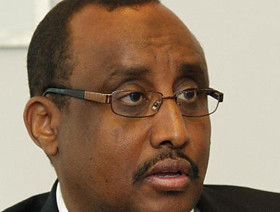
Somalia Transitional Federal Government (TFG) Interim Prime Minister Abdiweli Mohamed Ali Gas says that the breakaway Somaliland Republic is actually a part of Somalia. The TFG is backed by the United States and the West., a photo by Pan-African News Wire File Photos on Flickr.
Somalia's Puntland new president vows to fight insecurity
9:29am EST
By Abdiqani Hassan
GAROWE, Somalia (Reuters) - Parliament narrowly elected former prime minister Abdiweli Mohamed Ali as president of Puntland on Wednesday, backing his campaign against corruption and insecurity in the relatively peaceful Somali region.
At the tip of the Horn of Africa and with a third of Somalia's population of about 10 million, the semi-autonomous Puntland spans the north of Somalia and has largely escaped the worst of the country's upheaval of the last 20 years.
Somalia's central government and foreign powers advocating a loose federal political system in Somalia have held Puntland up as a possible model, having avoided the worst of a seven-year insurgency fought by militants seeking to impose a strict interpretation of sharia law.
But acts of violence have risen, the latest of which killed seven people in a car bomb attack on an armed convoy escorting foreigners working for a company training local security forces, on December 5 in Bosasso, a coastal city.
The authorities and Western diplomats are concerned al Shabaab may seek to strengthen ties with al Qaeda cells in Yemen, over the narrow Gulf of Aden.
Saciid Hassan Shire, the speaker for Puntland's parliament, declared Ali, an economist, the president-elect with 33 votes against outgoing leader Abdirahman Sheikh Mohamed Farole who got 32 votes in a run-off during the third round of voting by deputies.
"I promise progress and peace for Puntland in the coming five years, let's all work together in improving the security and development," Ali, a former prime minister for Somalia, said after his victory.
During the campaign, Ali accused his main rival of corruption and failing to curb insecurity. Farole has denied the allegations.
Farole told Reuters last year the number of al Shabaab militants in the region had risen after African troops drove them out of their southern strongholds.
Michele Cervone d'Urso, the EU special envoy to Somalia who attended the vote, said it had set a benchmark for peaceful elections for the rest of Somalia.
"The election is a positive for the democratization process. Now the president-elect can focus on defusing tensions between the different group of supporters," he told Reuters.
The region, roughly one-third of Somalia's geographical area, is believed to be rich in undeveloped energy resources and is being sized up by oil explorers.
Ali is yet to make his views on the oil exploration in the region public. Farole had said he would not allow Mogadishu to award oil contracts to foreign firms.
"It is hoped that he will fight al Shabaab in an effort to tighten security," Hussein Abdirahman, a history lecturer at Mogadishu University's branch in Bosasso told Reuters.
"Being an economist, people hope he will also improve economy and political ties with the federal government."
(Additional reporting by Abdi Sheikh in Mogadishu; Writing by James Macharia; Editing by Alison Williams)
No comments:
Post a Comment